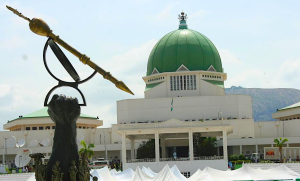Senate Denies Obasanjo’s Claims on Lawmakers’ Salaries
The Nigerian Senate firmly rejected former President Olusegun Obasanjo’s recent assertions that lawmakers set their own salaries beyond approved limits. This denial follows Obasanjo’s comments made during a meeting with members of the House of Representatives, where he criticized the financial practices of the legislature. The controversy highlights ongoing concerns regarding transparency and accountability in Nigeria’s political landscape, as citizens demand clarity on how their representatives are compensated.
In a statement released on August 11, 2024, Senate Spokesman Senator Yemi Adaramodu addressed the allegations directly. He asserted that the Senate operates strictly within the salary framework established by the Revenue Mobilisation Fiscal Allocation Commission (RMAFC). He emphasized that no senator has the authority to unilaterally determine their salary or receive additional financial benefits from the presidency. This clarification aims to dispel what the Senate described as “uncharitable and malicious” claims against its members.
Obasanjo made his comments during a gathering at the Olusegun Obasanjo Presidential Library in Abeokuta, reigniting debates about the ethical standards expected of public officials. He stated that the practice of lawmakers independently determining their salaries is both immoral and unconstitutional. Obasanjo further alleged that each federal lawmaker had received N200 million, a claim that has raised eyebrows among the public and prompted calls for greater scrutiny of legislative remuneration.
In response, the Senate challenged anyone with credible evidence to substantiate Obasanjo’s claims. It reiterated that the body only receives salaries allocated by the RMAFC. Senator Adaramodu pointed out that the funds associated with constituency projects do not serve personal gain but ensure that every region of Nigeria benefits from federal resources. He clarified that while senators propose these projects, relevant government ministries and agencies manage the actual contracting and payments.
“To set the record straight, the Senate stressed that it only receives the salary allocated to it by the Revenue Mobilisation Fiscal Allocation Commission, in strict accordance with constitutional provisions,” Adaramodu stated. He further explained that the funds for constituency projects vary depending on the number of constituencies in each state, aiming to ensure equitable distribution of federal resources across the nation.
The Senate’s rebuttal comes at a time when public trust in government institutions is waning. Citizens increasingly express concern about the integrity of their elected officials, especially regarding financial matters. Obasanjo’s allegations, as a prominent figure in Nigerian politics, have amplified these concerns, prompting many to call for more stringent oversight of lawmakers’ financial activities.
Moreover, the Senate’s response highlights the importance of accountability in governance. By challenging the former president to provide evidence for his claims, the Senate defends its reputation and reinforces the principle that public officials must operate within established legal frameworks. This incident serves as a reminder of the ongoing need for transparency in Nigeria’s political system, particularly in light of past scandals involving public officials and financial misconduct.
As the debate continues, many Nigerians wonder how such allegations can impact the legislative process and the overall perception of governance in the country. The Senate’s insistence on adhering to constitutional provisions may help restore some confidence among citizens, but the call for greater transparency remains a pressing issue. The public is keenly aware that the actions of their representatives significantly affect their lives, and they demand accountability at every level of government.
In conclusion, the Nigerian Senate’s robust denial of Obasanjo’s claims underscores the complexities of political accountability in Nigeria. As the nation grapples with issues of governance, transparency, and public trust, lawmakers must uphold the highest standards of integrity. The ongoing discourse surrounding lawmakers’ salaries and financial practices will likely continue to evolve as citizens remain vigilant in their pursuit of a government that operates with honesty and fairness.

The Senate’s commitment to transparency and adherence to constitutional guidelines is vital in addressing public concerns. As the political landscape in Nigeria continues to change, the relationship between lawmakers and the citizens they serve will undergo close scrutiny, ensuring that accountability remains at the forefront of governance.

